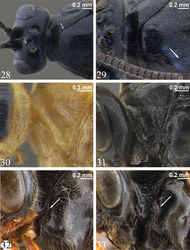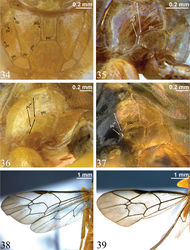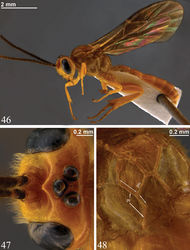Zambion kasparyani
| Notice: | This page is derived from the original publication listed below, whose author(s) should always be credited. Further contributors may edit and improve the content of this page and, consequently, need to be credited as well (see page history). Any assessment of factual correctness requires a careful review of the original article as well as of subsequent contributions.
If you are uncertain whether your planned contribution is correct or not, we suggest that you use the associated discussion page instead of editing the page directly. This page should be cited as follows (rationale):
Citation formats to copy and paste
BibTeX: @article{Bennett2011ZooKeys159, RIS/ Endnote: TY - JOUR Wikipedia/ Citizendium: <ref name="Bennett2011ZooKeys159">{{Citation See also the citation download page at the journal. |
Ordo: Hymenoptera
Familia: Ichneumonidae
Genus: Zambion
Name
Zambion kasparyani Bennett & Barnes, 2011 sp. n. – Wikispecies link – ZooBank link – Pensoft Profile
Diagnosis
Zambion kasparyani can be distinguished from all other Zambion spp. by combination of both of the following characters: 1) absence of a ventral transverse carina on the propodeum extending from the metasomal foramen to the pleural carina (Fig. 48) (contrast with condition in Zambion hirtum shown in Fig. 35); 2) mesosoma completely yellow to orange (Fig. 46) (no dark colour).
Description
Adult. Female unknown.
Male: Fore wing length 5.8 mm. Clypeus separated from supraclypeal area by a strong groove. Malar space 0.4 times basal width of mandible. Supraclypeal area 1.7 times as wide as high, dorsomedially without a short, narrow, longitudinal lamella between the antenna. Supra-antennal horn moderately long and triangular in dorsal view (Fig. 47), about equal in length to width of pedicel at midheight in lateral view. Ocello-ocular distance 1.2 times ocellar diameter. Gena 0.8 times transverse diameter of the eye. Antennal flagellum with 32 segments.
Notaulus absent. Epicnemial carina mostly straight medially, not curving away from anterior edge of mesopleuron near ventral corner of pronotum (similar to Zambion rogeri shown in Fig. 32). Scutellum with lateral carinae extending 0.4 length of scutellum. Medial longitudinal carinae of propodeum complete and strong anterior to posterior transverse carina (as in Fig. 3). Carina extending from pleural carina to spiracle complete (Fig. 48). Posterior transverse carina of propodeum with lateral abscissa roughly straight, joining pleural carina at about 0.4 distance from posterior end of pleural carina to propodeal spiracle (Fig. 48). Ventral transverse carina extending from metasomal foramen to pleural carina absent (Fig. 48). Fore tibia with a moderately strong apical point on dorsal surface. Hind femur 3.6 times as long as medial width. Hind tarsal claw pectinate to about 0.5. Angulation of fore wing vein 2m-cu strong.
Tergite 1 of metasoma 1.6 times as long as apical width. Dorsal longitudinal carinae of T1 extending to spiracle (0.4 length of tergite), dorsolateral longitudinal carinae extending just over half way to spiracle (0.3 distance of T1).
Yellow. Legs and metasoma slightly darker yellow apically/ posteriorly. Vertex and supra-antennal area medially, scape and mesoscutum orange. Pedicel and apex of mandible dark brown. Flagellum medium brown except base of first flagellomere orange. Entire membrane of fore wing moderately infumate (Fig. 46). Body covered with dense golden setae.
Material examined
Holotype ♂, Label 1: KENYA: Rift Valley Province. Marich Pass Field Studies Centre, 1°32.2'N, 35°27.4'E, 13–14 June 2000. Label 2: M.H. Bourbin, V.H. Lee & W.J. Pulawski collectrs [CAS]. Condition: intact.
Etymology
This species is named in honour of Dr. Dmitriy Kasparyan (Zoological Institute, Russian Academy of Sciences, St. Petersburg) for his contributions to ichneumonid taxonomy especially being the first to recognize and describe the genus Zambion.
Comments
see comments for Zambion monodon and Zambion hirtum.
Original Description
- Bennett, A; Barnes, D; 2011: Revision of the world species of Zambion (Hymenoptera, Ichneumonidae, Tryphoninae) ZooKeys, 159: 19-48. doi
Images
|
Other References
- ↑ Kasparyan D (1993) Zambion, a new tryphonine genus from Africa (Hymenoptera: Ichneumonidae). Zoosystematica Rossica 1: 86-88.
![Figures 1–3. Zambion monodon,holotype female 1 habitus 2 head, anterior view 3 propodeum and first metasomal segment, dorsal view. Figure reproduced from Kasparyan (1993)[1].](https://species-id.net/o/thumb.php?f=ZooKeys-159-019-g001.jpg&width=184)


